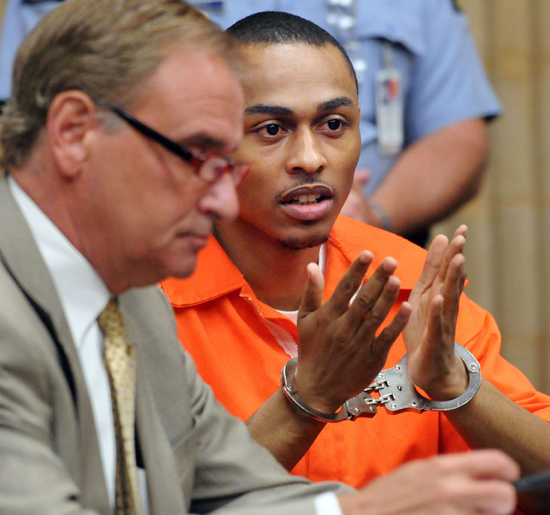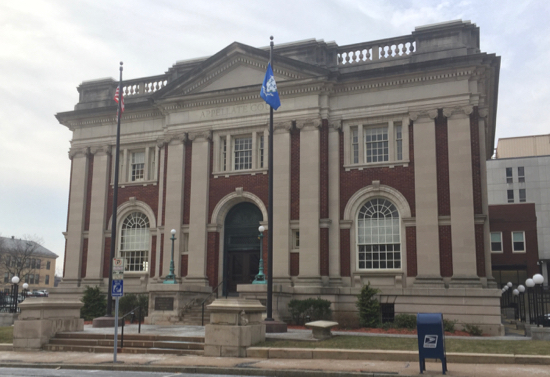 A convicted killer’s new lawyer said his client should have been allowed to defend himself during his 2014 murder trial, even though he had no legal experience.
A convicted killer’s new lawyer said his client should have been allowed to defend himself during his 2014 murder trial, even though he had no legal experience.
The lawyer, Glenn Falk, made his argument during a hearing Monday in state Appellate Court in Hartford.
Falk wants a three-judge appellate panel to set aside Ansonia resident Cordaryl Silva’s murder conviction and order a new trial.
Silva is serving a 50-year prison sentence after a jury convicted him in the fatal shooting of Javon Zimmerman in a Derby parking lot in 2012. Both men were accused by police of being active in the local narcotics trade.
A warrant from the case alleged Silva was becoming increasingly angry at Zimmerman for not showing respect for one of Silva’s relatives, who was serving time behind bars.
Falk said Silva’s trial had two serious flaws:
- Judge Denise D. Markle, the judge during Silva’s murder trial, should have allowed Silva to defend himself.
- The judge violated Silva’s Fifth Amendment rights by letting prosecutor Charles Stango ask a police detective whether Silva denied being the shooter, and later refer to Silva’s non-answer during his closing argument.
Falk, a lawyer at the New Haven Legal Assistance Association, spoke during a 45-minute hearing in front of three appellate judges — Michael R. Sheldon, Flemming L. Norcott Jr., and Eliot D. Prescott.
Brett Aiello, a special deputy assistant state’s attorney, represented the state. He argued the judge’s rulings did not violate Silva’s constitutional rights.
A decision will be handed down at a later date.
The lawyers and three judges spent the most time during Monday’s hearing dissecting Silva’s requests to represent himself at the trial.
According to the rules governing trials in Connecticut, a defendant can represent himself if a judge, after asking the defendant a series of questions, is satisfied that the defendant:
- Knows he has the right to a lawyer;
- “Possesses the intelligence and capacity to appreciate the consequences of the decision to represent oneself;”
- Understands the charges, the proceedings, possible punishments, and any other facts relevant to a “broad understanding” of the case;
- Is aware of the “dangers and disadvantages” of self-representation.
If a defendant makes such a request after a trial has started, judges have more discretion to reject them.
Silva v. His First Lawyer
Silva’s relationship with the lawyer who represented him at trial, Lawrence Hopkins, was strained, to say the least.
A year before the case even went to trial, Silva asked Judge Frank Iannotti to throw Hopkins, appointed as a special public defender, off the case.
The judge continued the case to allow Silva’s family time to get a new lawyer, but that never happened.
Months later, Silva told Judge Iannotti he could work with Hopkins.
During the trial itself, Silva asked the judge twice if he could represent himself, citing his dissatisfaction with Hopkins.
Silva’s first request was made immediately before testimony was due to begin, after he complained to the judge that Hopkins had not met with him or shared information about the case and hadn’t subpoenaed certain witnesses to testify.
Silva’s second request to act as his own lawyer happened several days later, when he said he was unhappy with how Hopkins was cross-examining witnesses.
Judge Markle denied both requests.
In denying Silva’s first request, the judge said it was made “on the absolute eve of the trial.” She also cited Hopkins’ legal experience in contrast to Silva’s lack of experience.
Silva’s second request came later in the trial, after Stango had questioned several witnesses.
Silva complained to the judge that Hopkins wasn’t asking the right questions on cross-examination.
Was It The Right Call?
Falk said the judge’s reasons for denying Silva’s requests were invalid.
Silva had his reasons for wanting to ask the questions he wanted to ask, Falk said.
“It was clear it wasn’t going to delay the trial and it was clear that this defendant was articulate and able to ask the questions,” Falk said. “Just because you don’t ask questions with the same strategic sense as an experienced attorney would doesn’t mean that you have no right to represent yourself, even at that late point.”
Aiello argued that Silva’s first request wasn’t really a request for self-representation at all — he was just unhappy with his lawyer’s decisions.

“I think he’s made it clear to the court that what he wants is for defense counsel to work with him,” Aiello said.
He said Judge Markle was entitled to deny Silva’s second request because a defendant’s rights to self-representation are “sharply curtailed” once the trial actually begins.
It was past the point of no return.
Falk also argued that testimony from a state police detective who questioned Silva should not have been allowed.
Silva was first detained by police five days after the shooting on a probation violation. He was charged with Zimmerman’s shooting a month later.
Silence Debated
State Police Detective Patrick Meehan questioned Silva shortly after he was detained.
The detective testified in 2014 that Silva was “pretty cooperative” during an interview — but asked directly about being the shooter, would not admit or deny it.
Instead, Silva gave Meehan a “blank stare” and shrugged his shoulders when asked about the shooting.
Falk said the prosecution used Silva’s silence against him during the murder trial. The defense lawyer said the move gutted Silva’s protections under the Fifth Amendment.
Falk argued that the prosecution made Silva’s silence a big deal in the case, even referring to it during closing arguments.
The line of questioning should not have been allowed in front of jurors, Falk said, because not answering a question doesn’t mean you’re guilty.
Sure, Silva answered some questions, but he wasn’t compelled to answer everything, the lawyer argued.
“In the state’s view, if you answer a bunch of questions at the police station, but then the police ask you point blank ‘Did you murder the victim?’ you have to answer that question or it can be used against you because you answered some other questions,” Falk said.
He cited a 1985 case where a murder conviction was thrown out on similar grounds.
Judge Sheldon noted that Hopkins (Silva’ trial lawyer) had not objected about the testimony during the trial, or filed a motion to suppress to prevent Stango from asking questions about it.
Falk said that Hopkins should have objected, but that the appellate court can still step in and order a new trial.
“The state made a great deal of all of this,” he said. “With the questioning of the defendant, with the questioning of Detective Meehan, and with its closing argument. And so the harm from this warrants a new trial.”
But Aiello, representing the state, pointed out that Silva’s silence wasn’t so simple.
Silva waived his right to silence before talking to Meehan, Aiello said, and did answer some questions about the shooting — just not whether he pulled the trigger.
Aiello said Stango’s use of Silva’s “selective silence” in questioning Meehan was not improper.
He also pointed out that Silva testified during the trial — and blamed a person he would only identify as “my boy” as the trigger-man.
That opened the door for Stango to bring up his conversation with Meehan on cross-examination, Aiello said, in an effort to “impeach,” or attack, the credibility of his testimony.
“The defendant got on the stand and on direct examination said that some mysterious third party did it,” Aiello said. “The state was then allowed to impeach him on that silence, to say ‘You had the opportunity in that interview to say that someone else did it and you were silent.’”
Falk disagreed, and said the issue goes to the heart of the constitutional right against self-incrimination.
“I can’t imagine the framers thought that in adopting this right not to incriminate yourself, that someone would be forced to answer, in an inquisition-like setting, ‘Did you murder Javon Zimmerman?’” he said.